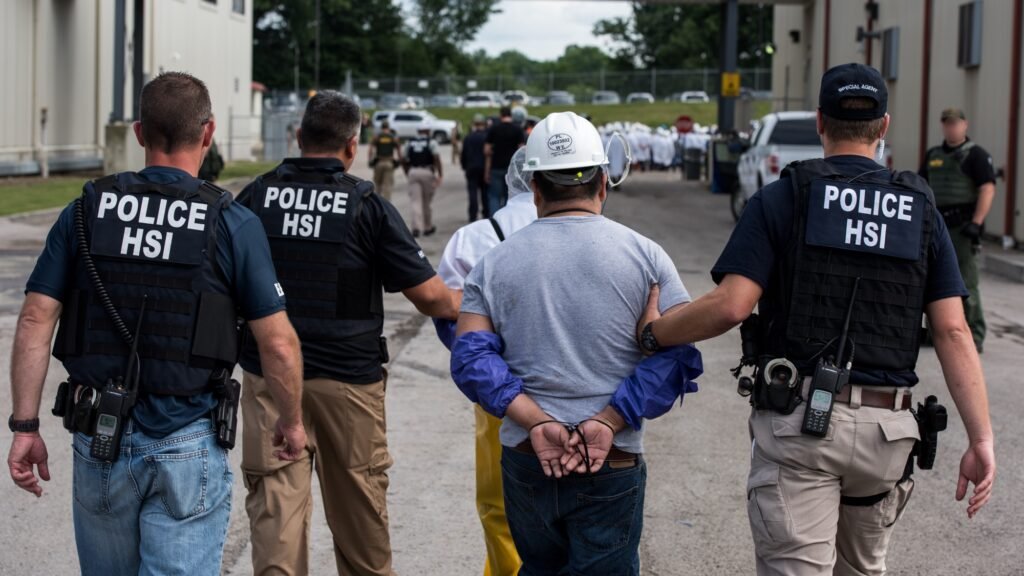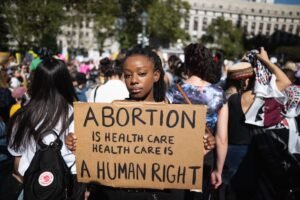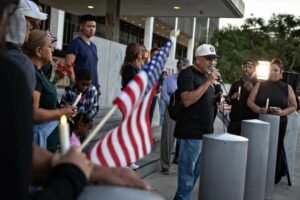The Trump administration has announced a significant shift in immigration enforcement policy, granting federal immigration authorities the power to arrest individuals in previously protected areas such as churches and schools. This move marks a departure from long-standing practices established under both Republican and Democratic administrations, which designated these sites as “sensitive locations” where enforcement actions were largely off-limits.
In a statement, Acting Homeland Security Secretary Benjamine Huffman confirmed the end of two major directives, giving U.S. Immigration and Customs Enforcement (ICE) agents greater discretion in carrying out arrests. The move also eliminates a legal pathway that previously allowed certain migrants to enter and remain in the United States under the humanitarian parole program.
“Criminals will no longer be able to hide in America’s schools and churches to avoid arrest. The Trump administration will not tie the hands of our brave law enforcement and instead trusts them to use common sense,” the statement reads.
Policy Changes and Their Implications
The rollback of the sensitive locations policy, first established in 2011 under the Obama administration and maintained under the Biden administration, raises concerns within immigrant advocacy groups. Critics argue that allowing ICE agents to make arrests at schools, churches, and hospitals could create a climate of fear among undocumented immigrants, deterring children from attending school and discouraging individuals from seeking medical care or legal assistance.
According to a report from the American Immigration Council, past enforcement actions near sensitive locations have led to widespread fear within immigrant communities, resulting in reduced school attendance and avoidance of critical services. Local advocacy groups, such as El Centro Hispano in Durham, have expressed concern that the policy shift will further marginalize immigrant populations already living in uncertainty.
“Our community members should feel safe in places of worship, at school, and when they seek medical attention,” said an El Centro Hispano spokesperson. “This change could push families deeper into the shadows, making them more vulnerable to exploitation and harm.”
Impact on Durham’s Immigrant Community
Durham, home to a diverse and growing immigrant population, could see significant effects from this policy shift. According to data from the Migration Policy Institute, approximately 12% of Durham County’s population is foreign-born, with many undocumented individuals contributing to the local economy and workforce. Faith-based organizations and educational institutions in the city have historically provided sanctuary and support to these individuals, and the new policy change may challenge their ability to do so without fear of federal intervention.
In response to the announcement, several Durham-area leaders, including members of the City Council, have reaffirmed their commitment to supporting immigrant communities. Local churches and advocacy organizations are exploring ways to continue offering resources and assistance while navigating the legal implications of the policy change.
“We stand with our immigrant neighbors and will continue to provide support in any way possible,” said Durham City Council member Javiera Caballero. “These policies should not undermine the trust we’ve built within our communities.”
Changes to Humanitarian Parole Programs
The second major policy change announced by the Trump administration involves the phaseout of parole programs that previously allowed certain migrants to temporarily reside and work in the U.S. The Biden administration had expanded these programs to accommodate individuals from multiple nationalities, a move Republicans criticized as an overreach. The new policy returns the program to a “case-by-case basis,” though specific details on which nationalities will be affected remain unclear.
“The Biden-Harris Administration abused the humanitarian parole program to indiscriminately allow 1.5 million migrants to enter our country. This was all stopped on day one of the Trump Administration,” the statement declared.
Immigration experts warn that rolling back parole programs could disrupt local economies, especially in cities like Durham, where immigrant workers play a vital role in sectors such as construction, hospitality, and healthcare.
What Comes Next for Durham Residents?
For Durham residents—both documented and undocumented—the policy changes introduce new challenges. Legal experts recommend that individuals affected by these changes seek professional guidance to understand their rights and explore available options. Community organizations, such as the Durham Immigrant Rights Coalition, continue to provide legal aid and support to those in need.
In the coming weeks, Durham city officials are expected to meet with community stakeholders to discuss potential responses to these federal policy changes. Residents are encouraged to stay informed and engaged in local efforts to support immigrant communities.
Stay Informed with Bull City Citizen
As Durham navigates the evolving landscape of immigration policy, Bull City Citizen remains committed to delivering accurate, unbiased reporting on issues that matter to our community. Stay connected with us for updates, expert analysis, and community perspectives on how federal policies impact life in Durham.
This developing story will continue to unfold, and Bull City Citizen will provide updates as more details emerge.












